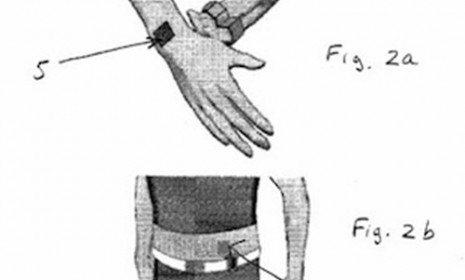The tattoo that tingles when your phone rings
Nokia is trying to better incorporate its phones with your life — literally

A free daily email with the biggest news stories of the day – and the best features from TheWeek.com
You are now subscribed
Your newsletter sign-up was successful
Nokia is giving the phrase 'spine-tingling' a whole new meaning. The Finnish cellphone manufacturer has submitted a patent application for a magnetic tattoo (see below) that will tingle when your phone rings. It's the latest attempt to capitalize on haptic feedback technology, or technology that communicates through touch (a more familiar example is the rumbling of a Nintendo Wii controller). Here, a guide to Nokia's magnetic touch:
How does a magnetic tattoo work?
The tattoo ink is enriched with metallic compounds that will be demagnetized before the ink is embedded in the skin. Once the tattoo has healed, the ink will be re-magnetized with permanent magnets. Your tattoo will then be sensitive to magnetic pulses, which theoretically can be emitted by a cellular phone.
The Week
Escape your echo chamber. Get the facts behind the news, plus analysis from multiple perspectives.

Sign up for The Week's Free Newsletters
From our morning news briefing to a weekly Good News Newsletter, get the best of The Week delivered directly to your inbox.
From our morning news briefing to a weekly Good News Newsletter, get the best of The Week delivered directly to your inbox.
What will a ringing phone feel like?
The tattoo will crackle with a tingling sensation, and you'll have to scratch it to dismiss the call. Your phone should be able to send you a variety of pulses, so different degrees of tingling will indicate whether your phone battery is dying, or alert you to text and voice messages. You should even be able to use your tattoo as an alarm clock in the morning.
Is Nokia serious about this?
Yes. It might sound "like science fiction," says Peter Suciu at TechNewsWorld, but it's likely that this technology will become "commonplace" in the future. Even if Nokia never sells a cellphone-tattoo, the patent application is evidence that companies believe technology will eventually be merged with our bodies in some form or another. Nokia's patent could even be seen as a preemptive move to profit off an inventor who creates a similar innovation in the future.
A free daily email with the biggest news stories of the day – and the best features from TheWeek.com
Do people really want to be physically linked to their phones?
Maybe. It would "mean an end to the days when a silenced cellphone means missing calls and text messages during a movie or music concert," says InnovationNewsDaily. And "at least you can never lose a tattoo," says Jamie Condoiffe at Gizmodo. The main problem is whether your "tattoo would need to be modified when you upgraded to a different device," says Leslie Horn at PCMag.
Sources: Daily Mail, Gizmodo, InnovationNewsDaily, PCMag, TechNewsWorld
-
 ‘The mark’s significance is psychological, if that’
‘The mark’s significance is psychological, if that’Instant Opinion Opinion, comment and editorials of the day
-
 How did ‘wine moms’ become the face of anti-ICE protests?
How did ‘wine moms’ become the face of anti-ICE protests?Today’s Big Question Women lead the resistance to Trump’s deportations
-
 Currencies: Why Trump wants a weak dollar
Currencies: Why Trump wants a weak dollarFeature The dollar has fallen 12% since Trump took office